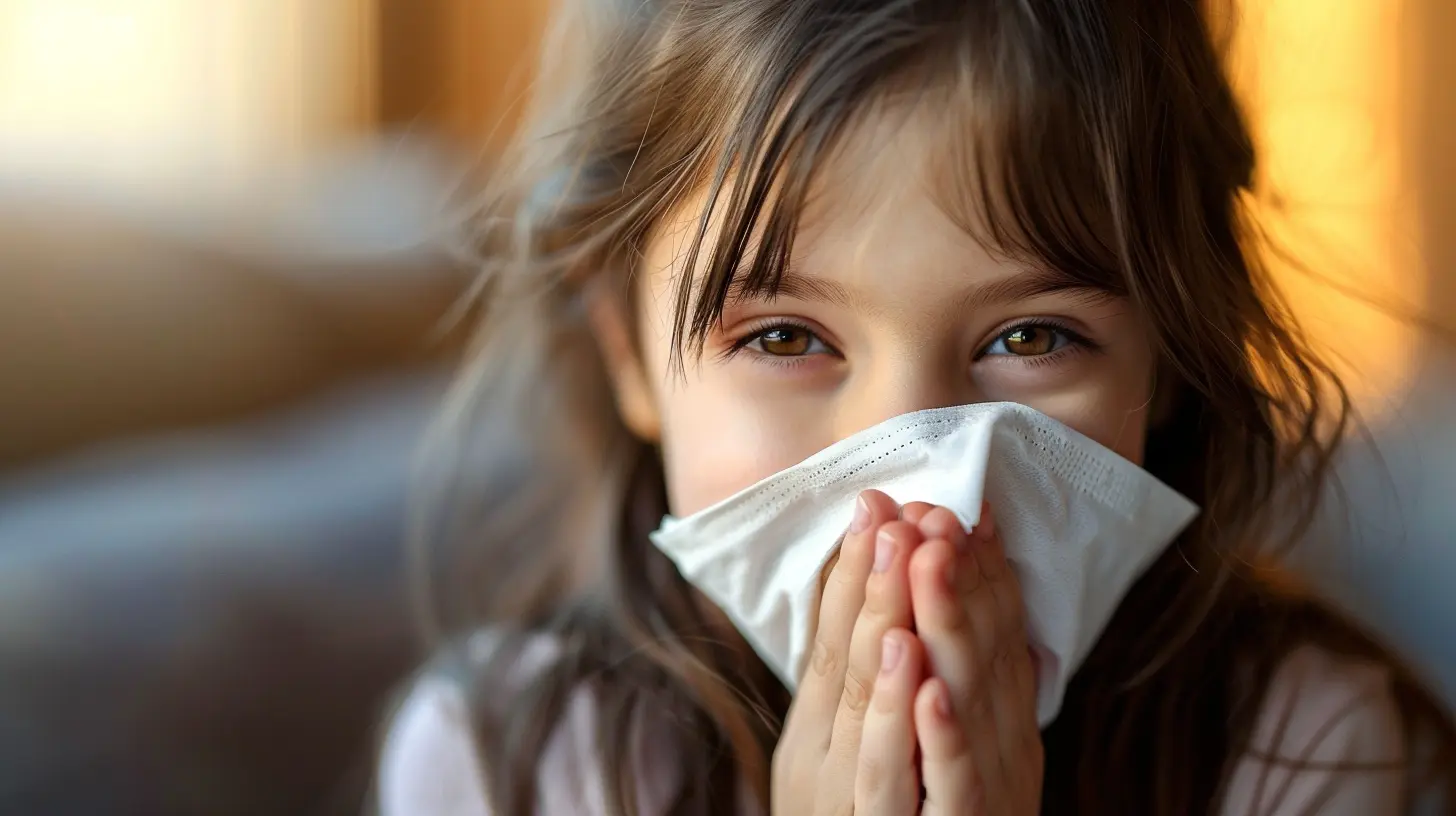Handling Stress-Induced Illnesses in Children: What Every Parent Should Know
20 August 2025
Let’s be real—parenting is a wild ride. One minute, your child is giggling uncontrollably over something silly, and the next, they’re curled up with a stomachache, and you’re left wondering, “Did they eat something funky? Or…could it be stress?” Yep, it turns out kids can feel stress just like we do, and sometimes, it doesn’t show up as tears or tantrums—it shows up as actual physical illness.
If you’ve ever looked at your kid and thought, “This doesn’t feel like a cold,” you’re not alone. Stress-induced illnesses in children are real, and they’re more common than we might think. Let’s dive into what these illnesses look like, why they happen, and most importantly—how we, as parents, can help our little ones manage them.
What Is Stress-Induced Illness in Children Anyway?
Stress-induced illness might sound like a term you’d hear in some high-level psychology class, but it’s actually a very down-to-earth issue. Basically, it’s when emotional stress triggers physical symptoms in the body. For kids, this is especially tricky because they don’t always know how to say, “Hey, I’m feeling really overwhelmed right now.”Instead, their stress leaks out in sneaky ways: stomachaches, headaches, fatigue, even skin rashes or trouble sleeping. It can mimic real medical conditions, which makes it super confusing for both child and parent.
So, What Does It Look Like?
Let’s break this down. A child under stress might experience:- Frequent stomachaches without any clear medical reason
- Headaches, especially during or right before school
- Trouble sleeping or nightmares
- A sudden drop in appetite—or emotional eating
- Increased irritability or sudden mood swings
- Constant fatigue, even after a night of sleep
- Bedwetting in younger children
- Skin issues like eczema or hives
Sounds familiar? You’re not imagining things. This isn’t just dramatic behavior—it’s their body crying out for help.
Why Are Kids So Stressed These Days?
Seriously though, they’re just kids—what do they have to be stressed about, right?Well, a lot.
Let’s take a walk in their little shoes. They're juggling school pressures, friend drama, extracurricular expectations, social media comparisons (yep, even for tweens), not to mention changes in the home environment, like a new sibling or moving houses. And when big stuff like divorce, bullying, or illness in the family comes into play? That’s a heavy load for anyone, let alone a child whose brain is still learning how to cope.
Even “good” stress—like a birthday party or family vacation—can overload their nervous system.
How Stress Affects the Body: The Science Bit (But Keepin’ It Simple)
So what actually happens inside that tiny body when stress hits?When a child feels stress, their body releases hormones like cortisol and adrenaline, triggering the "fight or flight" response. This is great if you’re running from a wild bear (which, hopefully, your kid isn’t). But when this state hangs around too long, it throws everything off balance—digestion, sleep, immune response, you name it.
And bam! That’s when you start seeing those physical symptoms.
It’s kind of like if your phone's battery is always on 10%. Things still technically work… but not very well. Your kid’s body is trying its best, but it’s just drained.
Differentiating Between Medical and Stress-Related Symptoms
Here’s the tricky part: just because your child’s headaches are stress-related doesn’t mean you should ignore them.First things first—rule out medical causes. Always. Talk to your pediatrician if symptoms persist or worsen. If everything checks out fine and the doctor gives the all-clear, then it’s time to explore the emotional angle.
Also, look for patterns. Do the tummy aches happen before school? Is there a meltdown before bedtime every Sunday night? Connect the dots. The body might be telling you something the child can’t verbalize.
What Can Parents Do? (Spoiler: You Have More Power Than You Think)
Okay, now for the good stuff. This is where you, superhero parent, come in.1. Create a Safe Space to Talk
Sometimes the cure starts with a conversation. Ask open-ended questions like:- “How was your day?”
- “What was the best part? What was the hardest?”
- “Anything bothering you that you want to talk about?”
Be patient. Kids might not spill everything right away, but if they know you’re a safe harbor, they’ll come to you when they’re ready.
2. Keep a Routine
Routines are comforting for kids. It’s like their brain knows what to expect next, and that predictability helps lower stress.Make sure they’re getting enough sleep, eating balanced meals, and having downtime. Yes, play is vital—boredom is underrated!
3. Teach Simple Coping Skills
Introduce easy tools for managing stress. Some go-to tricks:- Deep breathing (pretend you're blowing up a balloon)
- Drawing or journaling emotions
- Stretching or simple yoga moves
- Listening to calm music
- Positive affirmations (even writing them on sticky notes helps!)
Bonus: join in with them. You’ll bond and model healthy behavior.
4. Limit Over-Scheduling
We all want our kids to shine, but overpacking their day with sports, lessons, and clubs can backfire. Watch for signs your child is overwhelmed. If they're constantly tired or dreading activities they once enjoyed, it might be time to hit the pause button.Less is more sometimes.
5. Watch Your Own Stress Levels
Kids are little emotional sponges. If you’re always frazzled, they pick up on that. Use your own healthy coping strategies—and talk about them! Like: “Work was crazy today, so I’m going for a walk to clear my head.”It shows them it’s okay to feel overwhelmed, and there are positive ways to handle it.
When to Seek Professional Help
Let’s be honest, some situations need more than just bedtime talks and bubble baths.If your child:
- Has ongoing physical symptoms without a clear cause
- Is showing signs of depression or serious anxiety
- Avoids school or social situations
- Talks about hurting themselves
Please don’t wait. Talk to your pediatrician, and consider connecting with a child therapist. Mental health is just as important as physical health, and it’s okay to ask for help.
What Teachers and Caregivers Should Know
Your child’s support system doesn’t stop at home. Teachers, babysitters, coaches—they all play a role.Don’t be shy about cluing them in. If your child is going through a stressful period, let trusted adults know. They can keep an eye out for signs of distress and offer additional support in their own way.
The Long-Term Impact of Unmanaged Stress
Here’s the part that deserves our attention: if stress in kids goes unaddressed, it can lead to long-term physical and emotional health issues.We’re talking about:
- Chronic anxiety or depression
- Disorders like IBS or migraines
- Trouble focusing in school
- Low self-esteem
But here’s the empowering part—you can help shape the way your child handles life’s challenges. The coping skills they learn now become their foundation for adulthood.
Real Talk: Every Kid is Different
There’s no one-size-fits-all solution here. What works for your neighbor’s kid might not work for yours. And that’s okay.Some kids are naturally more sensitive or anxious. Others might seem to shrug everything off, only to break down when you least expect it. Tune into your child’s vibe and adjust accordingly.
It’s not about being the perfect parent—it’s about being a present one.
Final Thoughts
Stress-induced illnesses in children are complicated—but not insurmountable. With a little curiosity, a lot of listening, and a big dose of empathy, you can help your child not just feel better, but build resilience that lasts a lifetime.Remember, your job isn’t to eliminate all stress from their lives—it’s to teach them how to ride the waves. Because in this ocean called life, knowing how to swim is way better than staying out of the water.
So take a deep breath, trust your gut, and keep showing up. You’ve got this 💪🏽.
all images in this post were generated using AI tools
Category:
Childrens HealthAuthor:

Kelly Snow
Discussion
rate this article
1 comments
Malia McCoy
Thank you for addressing such an important topic. As parents, it's vital to recognize the link between stress and our children's health. Your insights remind us to be attentive and nurturing, fostering resilience in our little ones.
August 26, 2025 at 2:43 AM

Kelly Snow
Thank you for your thoughtful comment! I'm glad you found the insights valuable for fostering resilience in children.


